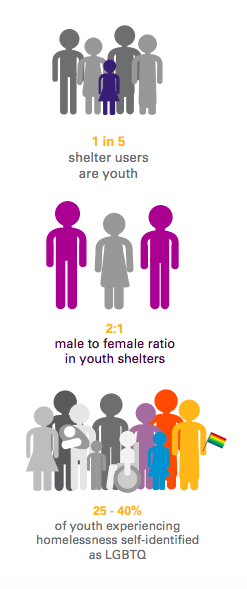In our latest website survey, Sharon W. asked the following: “Why are there so many homeless youth? What are parents saying about their kids that consider themselves homeless even though they have a home? Has a survey been done about the parents reaction and/or concerns about this because it is a growing trend?”
Before I get into my answer, I’ll start with a definition: “Youth homelessness refers to young people between the ages of 13 and 24 who are living independently of parents and/or caregivers, and importantly, lack many of the social supports deemed necessary for the transition from childhood to adulthood.”
 As Sharon mentioned, youth homelessness is, unfortunately, increasing. According to Rebecca Koeller’s (2008) data, youth under 24 are the fastest growing segment of Canada’s homeless population. There are many overlapping, complex reasons for this, but they are all related to the causes of general homelessness: structural factors (ie. poverty and lack of affordable housing), systems failures (ie. aging out of child welfare system or improper discharge from detention centres) and individual or relational factors (ie. mental health issues or family problems). There is no one reason why youth become homeless, and it certainly isn’t because being homeless is “cool.”
As Sharon mentioned, youth homelessness is, unfortunately, increasing. According to Rebecca Koeller’s (2008) data, youth under 24 are the fastest growing segment of Canada’s homeless population. There are many overlapping, complex reasons for this, but they are all related to the causes of general homelessness: structural factors (ie. poverty and lack of affordable housing), systems failures (ie. aging out of child welfare system or improper discharge from detention centres) and individual or relational factors (ie. mental health issues or family problems). There is no one reason why youth become homeless, and it certainly isn’t because being homeless is “cool.”
That said, research repeatedly points to a few predominant causes of youth homelessness. As summarized in Coming of Age: Reimagining the Response to Youth Homelessness in Canada:
The research on youth homelessness is fairly consistent in identifying difficult family situations and conflict as the key underlying factors in youth homelessness (Karabanow, 2004; Karabanow & Naylor, 2013; Gaetz & O’Grady, 2002; Braitstein et al., 2003; Hagan & McCarthy, 1997; Janus et al., 1995). There is extensive research in Canada and the United States that points to the fact that the majority of street youth come from homes where there were high levels of physical, sexual and emotional abuse, interpersonal violence and assault, parental neglect and exposure to domestic violence, etc. (Ballon et al., 2001; Gaetz et al., 2002; Karabanow, 2004; 2009; Rew et al., 2001; Thrane et al., 2006; Tyler & Bersani, 2008; Tyler et al., 2001; Whitbeck and Hoyt 1999; Van den Bree et al., 2009)
Similarly, a study conducted by Eva’s Initiatives found that 36.2% of participants in their Family Reconnect program cite ongoing conflict as the underlying cause of their family issues.
It’s important to remember, however, that not all youth become homeless because they are fleeing abusive situations. It is equally crucial to know that just because situations are not abusive, it doesn’t mean that they are free of conflict or harm. We must also consider the value of rebuilding relationships with family members, when possible.
As I wrote in a previous post, there is also a strong relationship between the child welfare system and youth homelessness. A Raising the Roof study found that 43% of street-involved youth had also been in foster care.
The unique challenges of LGBTQ2 youth
As reported in a study by CAMH and CAS, newcomer youth are most likely to experience conflict with their families due to intergenerational cultural differences. (This study received coverage in the Toronto Star, which is well worth reading to deepen context.) The second most reported reason is family disapproval of the youth’s sexual orientation, an unfortunately common situation for many youth experiencing homelessness.
Though we are making progress in battling homo-, bi- and transphobia, many teenagers become ostracized by their families for not meeting rigid expectations of gender and/or sexual orientation. This issue was also covered a Rolling Stone story about highly religious families disowning their LGBT teens. In the United States, LGBTQ2 people make up about 5% of the general youth population, but approximately 40% of the homeless-youth population. There are startling numbers from Canada as well, with researchers estimating that 25-40% of youth experiencing homelessness are LGBTQ2.
What parents are saying
It is hard to answer this part of the question because most research on youth homelessness focuses on the youth experiencing homelessness, how they came to this experience, what they go through and how we can prevent it. To my knowledge, there haven’t been any studies done from this perspective. (If you hear of one, please let us know!)
I would like to reiterate, however, that the vast majority of youth become homeless due to some kind of family conflict. Cases in which youth simply “run away” or don’t want to “follow rules” are few and far between – more often myth than reality. So even though family members may consider youth as “having a home,” that place might seem like anything but to the youth in question. In some situations, it is much safer for them to leave.
As Gaetz wrote in Youth Homelessness in Canada, the solution to youth homelessness isn’t in debating what is or isn’t a “home,” but in preventing the kinds of conflict, lack of social and economic supports, and so on that cause homelessness in the first place.
This post is part of our Friday "Ask the Hub" blog series. Have a homeless-related question you want answered? E-mail us at thehub@edu.yorku.ca and we will provide a research-based answer.
Photo: Coming of Age

